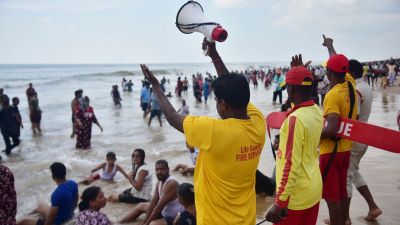Stay updated with the latest - Click here to follow us on Instagram
Patidar agitation: Hardik Patel’s movement has divided Gujarati society vertically
Patel’s movement has divided Gujarati society vertically. Those who are against reservation for Patels argue that 'Patel’ or `Patidar’ is not a caste but a designation.
 Patidar reservation agitation leader Hardik Patel.
Patidar reservation agitation leader Hardik Patel.
On Sunday, Hardik Patel, leader of the Patidar Anamat Andolan Samiti (PAAS) will start a reverse Dandi March along with his followers to spread his argument in favour of reservation for Patels in Gujarat. However, Gujarat-based political observers and social scientists believe Patel’s movement is actually a clandestine movement against the reservation system. It’s a cry for the abolition of reservation for the SC, ST and OBC categories, not to get it.
Patel’s movement has divided Gujarati society vertically. Those who are against reservation for Patels argue that ‘Patel’ or `Patidar’ is not a caste but a designation. Kanbi, Koli, Dhodiya castes in Gujarat were awarded the status of ‘Patel’. Hardik Patel’s forefathers were addressed as Kanbis. Traditionally, they were farm labourers or tenants (ganotiyas) of the upper caste jameendars and khatriya landowners and rajas in Saurashtra. Till 1956, Saurashtra had not merged with the erstwhile state of Mumbai.
Uchangrai Dhebar, then CM of Gujarat, brought reservation in the form of land reforms. He made it possible to allot land to tillers. ‘Khede teni jameen– land belongs to tillers’ was the new rule. Dhebar gifted through a new law, 34.5 lakh hectares to landless labourers, largely Patels. Overnight, Patels became land owners and Kashtriyas lost their land. It was, socially speaking, an earth-shaking event.
The Patels grabbed the opportunity. They educated their children, they diverted their income into small and medium scale businesses. In central Gujarat, a few Patels lost their land and that triggered their exodus to Africa, UK and USA. “The Patels were the biggest beneficiaries of land reservation,” says Uttam Parmar, a social activist based in south Gujarat who has done extensive research on social issues. If “reservation” for the tillers and poor land labourers had not been made then how would Patels have got any land at all?
Hardik Patel and his young clan seem to be unaware that the transition of land ownership created jealousy and feeling of injustice in Darbars (upper caste Kshatriyas) in Gujarat. Both sides have indulged in violence since. In 1915, Mahatma Gandhi included a large number of Kanbi Patels in the freedom movement – they were treated much better than Shudras. Also, Kanbis were never ready to be bracketed with Chamars or other lower castes named under SC category. That created an issue when the criteria was applied to Patels before giving reservation in 60s. It was the social revolution that the Patils in Maharashtra, the Jats in Punjab, Rajasthan and Haryana, the Kurmis in Bihar and the Nairs in south India could be land owners. Their current status is due to more land ownership which came their way due to the special efforts of the state and the Congress party under Nehru.
Today, the Patels are the most successful community of Gujarat. In education, real estate, politics, the social sectors, you can’t miss a Patel. What Hardik Patel– and those who are backing him — forget is that quintessentially ‘reservation’ is there to address and compensate social-inequality and social injustice. It is not about addressing economic deprivation. Those who support reservation for Patels are mostly upset with a section of Kanbis known as Aanjna Chowdhary. They are in minority in Patels but prosperous, own land and education institutes and have big businesses in dairy in and around Mehsana. Their prosperity is the root cause of Hardik Patel’s rise.
The Chowdhary Patels can get OBC status. That has created heartburns amongst other Patels. In the 60s when criteria for reservation was decided, the `Sata’ tradition of Chowdhary Patels helped them get into the OBC quotA. The Sata system – where a man who wants to marry a girl has to offer his sister to the family of prospective bride – is practiced around Mehsana. It was one of the major reasons that tilted decision in their favour. The Kadva and Leuva Patels could not prove convincingly that they were too
as “socially backward” as the Chowdharys were.
Professor Kirit Patel who teaches in Law College of Patan says, “If the government is ready to give us reservation then we are, now, ready to call ourselves “ nichli jaat.” Congress leader Madhavsinh Solanki had told The Indian Express that the Patels had been unwilling to call themselves, ‘nichli jaat’.
Professor Patel is unhappy with Hardik Patel. He says, “The Patels of Gujarat are in bad shape. They are riding a camel (Hardik) who is drunk and who does not know where he is going and why.”







